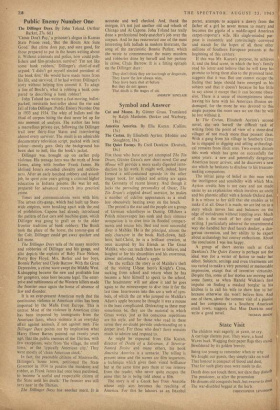Symbol and Answer
FOR those who have not yet attempted The Tin Drum, Gunter Grass's new short novel Cat and Mouse will provide a more easily digested intro- duction to his work. It might well, indeed, have formed a self-contained episode in the other longer book, for subject and setting are again the Germany of recent history. And though it lacks the pervading personality of Oscar, The Tin Drum's crippled dwarf narrator, he makes a number of sideline appearances as a small boy obsessively beating away on the beach.
• The period is the war and the people are a group of German schoolboys in Danzig. Offshore a Polish minesweeper has sunk and their summer occupation is to dive into its 'flooded compart- ments and rescue bits. Best and most successful diver is Mahlke. He is the principal, almost the only character in the book. Half-clown, half- hero, half-Christ, he is a brilliant creation, at once accepted by his friends as The Great Mahlke, who can teach them how to behave, and laughed at for his absurdities and his enormous, almost deformed, Adam's apple.
On the surface the story is of Mahlke's theft of the visiting U-boat hero's Knight's Cross, sacking from school and return when he has become a hero himself to speak to the school. The headmaster will not allow it and he goes again to the minesweeper to dive into it for the last time. Interwoven into this are a web of sym- bols, of which the cat who jumped on Mahlke's Adam's apple because he thought it was a mouse is the least complicated. Distracting as these may sometimes be, they are the material in which Grass works, just as his conscious repetitions are his style, and for those who read in these terms they no doubt provide understanding on a deeper level. For those who don't there remains much to admire and respond to.
As might be expected from Elia Kazan, director of Death of a Salesman, A Streetcar Named Desire and many others, his book America America is a scenario. The telling is present tense and the scenes are film sequences, a technique which gives them visual brilliance but at the same time puts them at one remove from the reader, who never quite escapes the sense that he is being told about a filen.
The story is of a Greek boy from Anatolia whose only aim becomes the reaching of America. For this he labours as an Istanbul porter, attempts to acquire a dowry from the father of a girl he never means to marry and becomes the gigolo of a middle-aged American carpet-importer's wife. His single-minded pur- pose is insistently and convincingly conveyed and stands for the hopes of all those other millions of Southern European peasants at the beginning of this century.
If this was Mr. Kazan's purpose, he achieves it, and the final scene, in which the boy's family read his letter and believe that he will keep his promise to bring them also to the promised land, suggests that it was. But one cannot escape the feeling that hope should have emerged as his subject and that it doesn't because he has little to say about it except that it can become obses- sive. There is a sense of incompleteness about leaving his hero with his American illusion un- damaged, for the more he was devoted to this single purpose the more sure we are that he will be lost without it.
In The Cretan, Elisabeth Ayrton's second novel, she sets herself the difficult task of writing from the point of view of a stone-deaf villager of not much more than peasant class. With a gang from his village in Southern Crete he is engaged in digging and selling archwologi- cal remains from illicit sites. Two events disturb this work which has gone on successfully for some years: a new and potentially dangerous American buyer arrives; and he discovers a new site which he hesitates to disclose to his treasure- seeking companions.
The initial jump of belief in this man with the intelligence and sensibility with which Mrs. Ayrton credits him is not easy and not made easier by an explanation which involves an uncle and his platonic affair with a female Oxford don. It is a tribute to her skill that she enables us to make it at all. Once it is made, we are led on to a story which moves fast and balances on the edge of melodrama without toppling over. Much of this is the result of her clear and simple writing. I particularly admired the unsentimental way she handled her deaf hero's donkey, a dan- gerous invention, and her ability to be expert about archaeology but convey enthusiasm. About the conclusion I was less happy.
A group of short stories such as Cecil Dawkins's The Quiet Enemy is perhaps not the ideal way for a writer of fiction to make her debut. Subjects, settings and even treatments are too varied to make a very personal or memorable impression, except that of inventive virtuosity. Despite this, some of her stories are moving and some funny, as when Harold Widkins's first impulse on finding a masked burglar in his kitchen is to call his wife to show him to her because otherwise she won't believe him. And one of them, about the summer visit of a pianist and her companion to a Southern American small town, suggests that Miss Dawkins may
write a good novel.
THOMAS HINVE1






























 Previous page
Previous page